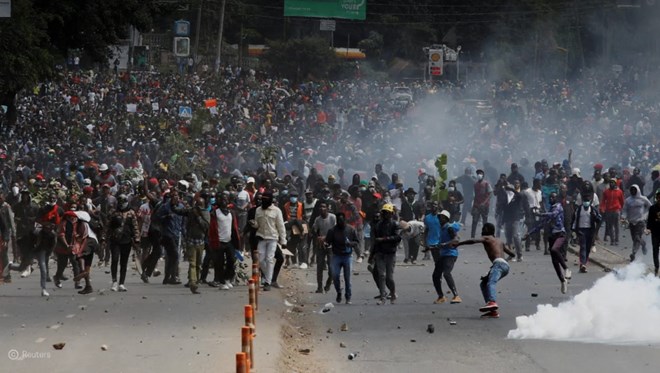Friday July 25, 2025
By Mohamed Farah Hussein
Kenya’s current wave of political unrest presents a sobering challenge for Somali investors, many of whom have helped shape the country’s urban and commercial fabric over the past two decades. From Eastleigh’s bustling markets to high-rise developments in South C and Parklands, Somali capital has been instrumental in driving Kenya’s economic diversification. Yet, in a climate of protests, looting, and political uncertainty, the calculus is shifting.

Image from the protests (Source: Equals blog)
Vulnerabilities and Risks
Periods of instability often escalate social tensions. Somali entrepreneurs—already navigating complex identity dynamics—may face increased scrutiny or be unfairly linked to political faulty lines. Community leadership will be crucial in defusing these risks and defending investor interests.
The most immediate concern is property damage. With businesses at the front lines of unrest, Somali-owned assets—often concentrated in high-density urban districts—face elevated risk. Rising insurance premiums, disrupted supply chains, and reduced customer footfall compound the problem.
Moreover, the socio-political climate can amplify tensions. Minority communities, including Somalis, have historically been vulnerable to scapegoating during times of upheaval. Calls for greater regulatory scrutiny could emerge, placing additional pressure on an already cautious investor base.
Historical and Recent Patterns of Scapegoating
Populist politicians often exploit ethnic narratives to deflect blame or rally support, and in Kenya, Somalis have been scapegoated during periods of unrest, insecurity, or political tension.
• Counter-Terror Crackdowns: During operations like Usalama Watch in 2014, thousands of Somalis were arbitrarily arrested, harassed, and even deported—despite many being legal residents or citizens.
• Post-Attack Backlash: After terror incidents linked to al-Shabaab, Somali communities—especially in Eastleigh—have faced profiling, raids, and extortion.
• Political Rhetoric: Some politicians have falsely blamed Somali economic success for underdevelopment in other regions, particularly Mt. Kenya, fuelling resentment and xenophobic narratives.
• Social Media Amplification: Terms like “Somali Oligarchs” or “Pirate money laundering” have been used to stir ethnic tension online, despite Somali contributions to Kenya’s economy being rooted in entrepreneurship and resilience.
Why Populists Target Somalis
• Visibility and Success: Somali businesses dominate sectors like real estate, logistics, and retail. Populists may frame this success as “unfair dominance” or “economic soft-power” to stoke envy.
• Security Stereotypes: The link between Somalia and terrorism is often misused to justify collective punishment or surveillance of Somali communities.
• Political Expediency: In times of unrest, blaming a minority group can distract from government failures or unify a fractured base.
Counter-Narratives and Resistance
• Public Pushback: Kenyan media, civil society, and Somali leaders have increasingly condemned scapegoating and called for inclusive governance.
• Legal Advocacy: Organizations like Amnesty International and Human Rights Watch have documented abuses and pressured the government to uphold constitutional protections.
• Community Resilience: Somali Kenyans continue to assert their identity and rights, contributing to national development while resisting marginalization.
Strategic Adaptation
Despite these challenges, Somali investors bring a legacy of resilience and adaptability. Somali businesses operate through collaborative networking, which some say is unique to the Somali culture, pooling resources together in ways that allow for flexible risk sharing and rapid response. Some are pivoting toward sectors like e-commerce, healthcare and education, where volatility may be lower.
Political engagement is also growing and, with Somali leaders advocating for stability and inclusion at local and national levels. Their voices may become crucial in shaping investment-friendly reforms and protecting community interests.
A Crossroads of Opportunity
Yet, Somali investors are not new to volatility. Operating through tight-knit networks, they’ve shown a capacity for rapid adaptation—diversifying portfolios, shifting capital to resilient sectors, and engaging policymakers when necessary. Their agility could be an advantage in steering through Kenya’s shifting political landscape.
While the unrest poses undeniable risks, it may also serve as a catalyst for Somali investors to reassess their regional strategy. Diversifying into neighbouring markets, strengthening diaspora ties, or rechannelling investment toward Somalia’s emerging sectors—such as its blue economy, Minning, Agriculture and Livestock (refer to my previous article about Unlocking Somalia’s Future towards Sustainable Prosperity)—are possibilities worth exploring.
In this moment of uncertainty, Somali investors in Kenya stand not only as economic stakeholders, but as community pillars whose decisions could shape both recovery and resilience of the Somali economy.
Academic and Policy Sources
These sources provide historical, political, and sociological perspectives on how Somalis have been marginalized, profiled, and politicized in Kenya—especially during times of unrest or electoral tension.
References
Rendering Difference Visible: The Kenyan State and Its Somali Citizens, Emma Lochery, Oxford Academic – African Affairs
Decolonizing Sovereignty: States of Exception along the Kenya-Somali Frontier, Julie MacArthur, American Historical Review
The Kenyan State’s Fear of Somali Identity, Dominic Burbidge, Academia.edu
Enemies of Democracy: Populism and Scapegoating, Denis Muller, SpringerLink
Ethnic Politics in Kenya, Emory University Scholars, Scholar Blogs – Emory University
Kenya: Somalis Scapegoated in Counter-Terror Crackdown, Amnesty International, Amnesty International
The Precarious Fate of Kenyan-Somalis, Abdullahi Boru Halakhe, Somali Spot Forum
The Somali Conflict and Kenya’s Foreign Policy: A Critical Assessment, John Inms, University of Nairobi
This piece was written by Mohamed Farah Hussein who is a lecturer in Business at Newham College London, UK, he can be contacted via email here: Mrashid114@yahoo.com